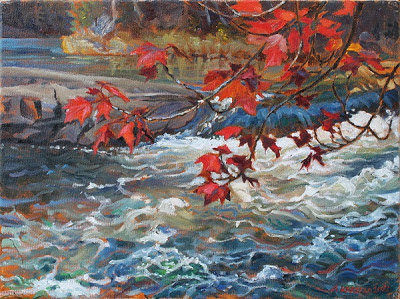DISPLACING HONESTY (watercolour 5 x 7 in.) Sold
3 November finds me still fascinated by the flat satiny pockets of Honesty's seed pods. Lunaria annua, or the "Money Plant" of my childhood. This one has only one of its pods unopened, with the seed shadows showing through the translucent membrane. The others have opened and dispersed their seeds, leaving the thin tissues of one side of each pod still attached, to vibrate in the light autumn breeze, sending sun reflections flickering through the Canada Plum thicket behind our house in Bishops Mills.
Beside it I have painted a seed head of Allium tricoccum, called Ramps in the Appalachians and Wild Leek in Ontario. We've transplanted them here from various places through the years as we bring home our woodsy harvests, and we pick a few garlicky flavoured leaves each spring for our salads, leaving the bulbs to continue to grow. This spring for the first time, we had clumps that were large enough to disperse through the grove, encouraging this edible native to replace the invasive Honesty as an understory herb.




Our aversion to "Wild Leek" as an English name for Allium tricoccum is a restriction we've placed on using "wild" as an adjective. It seems to us that formulations such as "wildflower," and "wildlife," and species names like Wild Rice, assert the primacy of domesticated lineages, and we don't feel they should be used in ecocentric discourse; to be "wild" is the original condition of all things, and shouldn't be used as a label, as if it were an abnormality. We feel that the adjective 'wild' is correctly applied only to the feral descendants of previously domesticated lineages (e.g. 'wild Apple'). see http://pinicola.ca/devildic.pdf
ReplyDelete